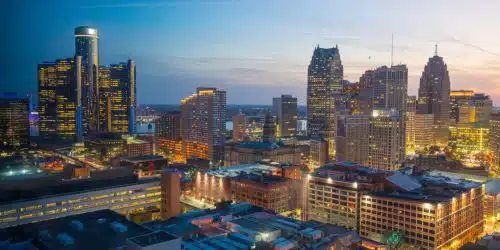Detroit, a city rich in history and recognized for its lively culture, has frequently been the topic of safety issues and controversies. In this blog post, we delve into the question on many people’s minds: Is Detroit safe? We will analyze the city’s current condition of safety, stressing both the issues it faces and the excellent actions taken to make it a safer place for residents and visitors. So, let us go out on our adventure to discover the truth about Detroit’s safety.
Understanding Safety Perception
It is critical to understand the impact perception plays in determining public opinion when appraising the safety of any city, especially Detroit. Perception frequently affects people’s decisions to travel to or live in a specific location. Unfortunately, Detroit has a long history of being linked to poor safety standards. Popular culture and media coverage have contributed to this perception, which is detrimental to the city’s true character.
When assessing whether Detroit is safe, it is critical to distinguish between perception and reality. While the city has experienced enormous issues in the past, it is crucial to recognize the progress accomplished in recent years. The city’s narrative is evolving, and it’s time to critically examine whether Detroit is safe.
Is Detroit Safe? Analyzing Detroit’s Crime Statistics
To acquire a full view of whether Detroit is safe, crime statistics and patterns must be examined. While the city has faced its fair share of crime-related issues, it is crucial to evaluate recent data that sheds light on the present state of affairs.
Contrary to popular belief, Detroit has experienced a decrease in crime rates throughout the years. The Federal Bureau of Investigation (FBI) reports that violent and property crime rates in Detroit have been progressively declining. These encouraging developments reflect the combined efforts of law enforcement agencies, community organizations, and people to combat crime.
In recent years, violent crimes such as homicides, robberies, and aggravated assaults have decreased. To counteract these violations, the city has established focused tactics that focus on improving police response times, enhancing community policing activities, and increasing collaboration with local organizations.
Detroit has also made tremendous progress in terms of property crimes such as burglaries and thefts. Increased community involvement, neighborhood watch programs, and increased security measures have all contributed to a decrease in these crimes. Furthermore, the city’s redevelopment efforts and economic progress have contributed to a decrease in property crimes by improving the general quality of life and generating a sense of ownership in the community.
Investigating Community Safety in Detroit
Detroit is a metropolis with several different neighborhoods, each with its own set of traits and safety concerns. It is critical to remember that safety varies from area to neighborhood, and a thorough assessment necessitates an examination of the unique safety measures and programs in place.
While some Detroit communities have historically had higher crime rates, it is critical to highlight the citywide initiatives to improve safety. Many neighborhoods have seen major renovations and strengthened safety measures, providing residents and visitors with a sense of security.
Downtown, Midtown, and Corktown have all witnessed significant alterations in recent years. These locations have had revitalization efforts that have drawn new businesses, residents, and visitors. Safety has become a concern as economic activity and community engagement have expanded, resulting in strengthened security measures and improved safety perceptions.
Furthermore, neighborhood associations and community organizations have played an important role in promoting safety in their local communities. Residents actively contribute to preserving a safe environment in Detroit through initiatives such as neighborhood watch groups, community clean-up activities, and regular communication with police enforcement.
However, it is crucial to recognize that challenges continue in some neighborhoods. Despite advances, certain communities continue to have higher crime rates and safety issues. To address these challenges, efforts are being made, with an emphasis on targeted interventions, greater police presence, and coordination between law enforcement and community groups.
Initiatives and Community Engagement
In a metropolis like Detroit, addressing safety concerns necessitates a collaborative strategy involving many stakeholders and community engagement. Over the years, Detroit has launched a variety of programs aimed at making its citizens and visitors safer.
Through preemptive steps and effective partnerships, law enforcement agencies, community organizations, and people have joined forces to improve safety. The Detroit Police Department’s community policing program, which stresses creating relationships between officers and the communities they serve, is one notable project. This strategy builds trust, increases communication, and encourages citizens to take an active role in crime prevention activities.
Neighborhood watch programs have also played an important part in improving safety in Detroit. These initiatives encourage communities to be attentive and watch out for one another, which effectively discourages criminal activities. These proactive community actions contribute to a safer environment by holding frequent meetings, sharing information, and coordinating with law enforcement.
Furthermore, community organizations and nonprofits have undertaken projects to address the underlying causes of crime and encourage constructive engagement. Youth programs, mentorship initiatives, and educational opportunities offer alternatives to at-risk persons, assisting in the reduction of crime rates and the creation of a brighter future for Detroit’s youngsters.
Law enforcement and community stakeholders work together on more than just crime prevention. The city has introduced initiatives in restorative justice, conflict mediation, and rehabilitation. These projects seek to interrupt the cycle of crime by addressing the underlying factors that lead to it, resulting in a more inclusive and safe Detroit community.
Impact of Revitalization on Safety
One important factor that adds to a city’s safety is its general economic vitality and redevelopment efforts. Detroit, a city famed for its tenacity, has seen a dramatic transformation in recent years, with considerable investments in urban development and commercial growth.
The rebirth of Detroit has had a favorable impact on safety, as economic growth and better living circumstances are directly related to lower crime rates. As areas are revitalized, abandoned houses are repaired, vacant lots are converted into green spaces, and blight is removed. These initiatives generate a sense of pride and ownership among residents, resulting in a safer environment.
The influx of new enterprises and job opportunities also helps to improve safety. Individuals have more access to reliable income as employment options expand, lessening the risk of engaging in criminal activity. Economic growth has a good ripple effect, improving citizens’ quality of life and drawing new investments to the community.
Furthermore, the renovation of commercial districts such as Downtown and Midtown has resulted in increased foot traffic and a thriving street life. Well-lit streets, bustling shops, and active public places all contribute to an environment that discourages criminal activity. People’s presence, both residents and visitors, adds to a sense of safety and security.
The city’s attempts to attract tourists and develop cultural attractions have influenced safety. Detroit has become a destination for art, culture, and entertainment as a result of the renovation of historic buildings such as the Detroit Institute of Arts, the Detroit Historical Museum, and the Detroit Riverfront. A booming tourism business means increased surveillance, additional security measures, and a greater sense of security for both visitors and inhabitants.
Uncovering Whether Detroit is Safe for Tourists: Security Measures in Detroit
Tourist safety is critical for every city that wants to attract visitors. Detroit has implemented a variety of initiatives to improve tourist safety and security, giving them a pleasurable and secure experience.
Detroit law enforcement authorities have prioritized tourist safety by expanding police presence in prominent tourist areas. Patrols are undertaken on foot and in vehicles to dissuade criminal behavior and to resolve any safety problems as soon as possible. This conspicuous presence gives travelers confidence and fosters a sense of security.
Law enforcement and the tourism industry must work together to keep people safe. To ensure the safety of visitors, tourist regions frequently collaborate with local police agencies, private security organizations, and monitoring systems. Furthermore, the city collaborates with hotels, restaurants, and entertainment venues to provide security measures such as trained personnel, video monitoring, and emergency response protocols.
Tourist-targeted information and awareness programs are critical for improving safety. The city of Detroit provides visitors with materials such as maps, pamphlets, and internet platforms to educate them about safe neighborhoods, transportation options, and potential concerns. Tourists are asked to stay educated, be attentive, and take the appropriate precautions to safeguard their personal belongings and well-being.
To improve tourist safety, Detroit’s transit system has also been improved. Buses and the QLine streetcar, for example, have installed safety measures such as surveillance cameras and more security officers. Furthermore, efforts have been undertaken to improve public area lighting and accessibility, making them safer for pedestrians and tourists.
Unveiling Personal Safety: Tips for a Safe Visit to Detroit
While Detroit has made considerable progress in increasing safety, individuals must take personal responsibility for their safety. Residents and tourists alike can improve their security and have a worry-free experience in the city by following some basic safety recommendations.
- Stay aware of your surroundings: Keep an eye on your surroundings at all times, especially in strange places. Be aware of who is around you and trust your senses if anything doesn’t feel right.
- Use well-lit and populated areas: Stick to well-lit streets and regions with high foot activity, especially at night. Avoid remote or poorly lighted areas that may be more dangerous.
- Secure your belongings: Keep your personal belongings secure and out of sight, including wallets, purses, and mobile devices. Displaying valuable objects that may attract unwanted attention should be avoided.
- Use dependable transportation: Choose respectable modes of transportation such as licensed taxis, ride-sharing services, or public transportation.
- Trust official information sources: For reliable and up-to-date information about attractions, events, and safety advisories, turn to official information sources such as tourism websites or local authorities.
- Follow local rules and regulations: Get to know your local laws and regulations so you can stay on the right side of the law. To avoid misunderstandings or confrontations, respect local customs and traditions.
- Stay connected: Keep your cell phone charged and conveniently available in case of an emergency. Save crucial contact information, such as local emergency services and your lodging, for easy access.
Remember personal safety is a shared responsibility. By following these guidelines and being aware of your surroundings, you can help to create a safer environment for yourself and those around you.
Understanding Safety in Detroit: Unveiling Local Perspectives
It is critical to include the viewpoints of local inhabitants to acquire a thorough understanding of safety in Detroit. Their perspectives provide crucial firsthand experiences and impressions of municipal safety.
Local folks recognize Detroit’s accomplishments in enhancing safety. Many communities have seen beneficial changes, such as lower crime rates and improved community engagement. Citizens value the joint efforts of law enforcement, community organizations, and citizens themselves in making the neighborhood safer.
However, it is crucial to remember that safety problems remain in some regions. Some residents believe that more efforts should be made to combat crime and improve safety infrastructure. They stress the significance of enhanced police presence, effective emergency response systems, and focused actions to address specific concerns.
Community involvement is regarded as an essential component of improving safety. Residents regularly participate in neighborhood watch programs, community clean-up activities, and law enforcement contact. They believe that cultivating a sense of unity, common responsibility, and open communication helps to make a community safer and more cohesive.
Locals also stress the importance of economic development in encouraging safety. They acknowledge that job opportunities, economic growth, and community revitalization projects improve people’s views of safety. Long-term safety improvement is viewed as a vital component of creating a flourishing economy, attracting businesses, and providing resources for education and employment possibilities.
Is it safe to walk in downtown Detroit at night?
Walking at night in downtown Detroit is generally safe, especially in densely populated areas with high foot traffic. The city has made major steps to improve downtown safety by increasing police presence, improving lighting, and launching community engagement projects. Many famous downtown locations, like Campus Martius Park and Woodward Avenue, are well-kept and constantly guarded by police authorities.
Is Detroit safe to visit as a tourist?
Yes, it is normally safe to visit Detroit as a tourist. The city has made tremendous progress in increasing safety and has put in place a variety of measures to protect citizens and visitors. Downtown Detroit, in particular, has undergone revitalization efforts and has emerged as a bustling and popular tourist attraction.
What parts of downtown Detroit are safe?
Downtown Detroit has various areas that are typically deemed safe for residents and visitors. These are some examples:
- Campus Martius Park
- Woodward Avenue
- Greektown
- Detroit Riverfront
- Entertainment District
While these regions are typically regarded as safe, it’s always a good idea to be cautious and aware of your surroundings, especially if you’re strolling at night or in less populated areas of Detroit.
Is Detroit safe to drive through?
Driving around Detroit can be safe, but certain things must be considered and measures taken. Here are some things to think about when driving in Detroit:
- Obey traffic laws.
- Keep an eye out for road conditions.
- Stay away from high-crime zones.
How walkable is Detroit?
Detroit has been working to increase its walkability, especially in the downtown region. While the city is known for its automotive culture and sprawling layout, several neighborhoods and areas are walkable. Here are some major points of Detroit’s walkability:
- Downtown
- Riverfront
- Midtown
- Public Transportation
- Neighborhoods
- Pedestrian Infrastructure
Conclusion
Finally, there is no clear, one-size-fits-all solution to the question, “Is Detroit safe?” While the city has historically experienced serious safety concerns, Detroit has made amazing progress in recent years. Crime rates have been declining, and the city has adopted several programs and community engagement projects to improve safety.
Many communities have become safer as a result of revitalization efforts, economic growth, and the dedication of residents and stakeholders. However, it is critical to remain cautious, adopt personal safety precautions, and be aware that safety varies within the city.
- DENVER CRIME RATE IN 2023-2024
- SEATTLE CRIME RATE IN 2023-2024
- SAFEST CITIES IN COLORADO IN 2023
- TOP 10 SAFEST COUNTRIES IN SOUTH AMERICA: The Ultimate Guide
- IS AIRBNB SAFE? All You Need To Know






